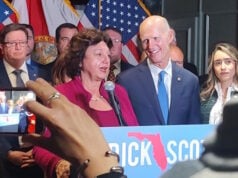
Since founding the Latino Center on Aging in 1991, Mario Tapia has been conscious of the disconnect between Latinos and Alzheimer’s support networks. Florida entities in charge of providing those resources are still not fully meeting the growing demand, he said.
The need to reach the Spanish-speaking community is more palpable than ever since a July study analyzing the prevalence of the brain disorder found that Latinos are 1.5 times more likely to develop Alzheimer’s than their white counterparts.
Therefore, it is not a coincidence that Miami-Dade County — where Latinos make up nearly 70% of the population — leads the country in the rate of people 65 and older living with Alzheimer’s.
Latinos who have Alzheimer’s can also face the added challenge of a language barrier, Alzheimer’s researchers at the University of Miami said in an interview with the Florida Phoenix.
Days after the study was published, Lt. Gov. Jeanette Nuñez held a press conference and touted Alzheimer’s funding in the state budget for 2023-24. There was $8.5 million for 17 Memory Disorder Clinics statewide, nearly $500,000 for the educational Alzheimer’s Association Brain Bus, and more than $1 million for the Florida Alzheimer’s Center of Excellence, among other initiatives, according to state budget documents in the Florida Legislature.
Miami-Dade County has the highest rate of Alzheimer’s in the country, according to a July 2023 study. Photo credit: Robina Weermeijer / Unsplash
The Florida Department of Elder Affairs manages the state funds for the memory clinics and Alzheimer’s task forces.
A spokesperson at the department didn’t mention any specific funding set aside for outreach to Spanish-speaking communities. However, many of the department’s staff speak Spanish, communications director Sarah Stevenson wrote to the Phoenix.
Additionally, other agencies that receive funding from the department can choose to offer community engagement opportunities in Spanish, Stevenson wrote.
Not enough publicity?
To Tapia, the problem is not a lack of resources. Instead, there’s not enough publicity about the support that already exists, he said.
Approximately half of Hispanic adults in the U.S. say they have a close friend or family member who needs a Spanish-speaking healthcare provider or translator, according to a 2022 Pew Research Center analysis.
“We have held 11 conferences on Alzheimer’s not because we don’t have other things to do,” Tapia told the Phoenix in a phone interview. “The [advocacy group] is not an Alzheimer’s organization, but we have had to take on that leadership role in our community. We have held two nationwide conferences on Alzheimer’s because the problem is not only here.”
The organization is based in New York City and Miami.
“There is not enough information being distributed in Spanish in communities with a higher concentration of Hispanics,” he said.
Most worrying is what is going to happen if the agencies don’t catch up as the population ages, Tapia said. The Alzheimer’s Association estimates that by 2025, there will be 140,000 more Floridians with the disease.
The Alzheimer’s Association operates the Brain Bus, which travels to different counties to raise awareness of early detection signs of the memory-robbing disease.
The bus is one of the ways the association aims to minimize health disparities in Black and Latino communities, said Keith Gibson, the director of diversity, equity and inclusion at the association’s Southeast Florida chapter. That goal became a strategic pillar of the organization following the murder of George Floyd, a Black man who died at the hands of Minneapolis police in 2020.
Culturally competent care
Findings from the Rush University Medical Center in Chicago that Black people are twice as likely than White people to have Alzheimer’s also contribute to the county’s 16.6% prevalence of the disease. People who identify as Black comprise 17.1% of the county’s population, according to U.S. Census data.
One of the program managers of the Brain Bus is bilingual, Gibson said.
“We can have all the wonderful resources in the world, but if they’re not attainable because of demographics, we have to rethink the whole process,” he said. “So, that’s what the Brain Bus does. It affords us an opportunity to go into these hard-to-reach communities.”
One entity the Latino Center on Aging has relied on in its efforts to raise awareness of Alzheimer’s is the Evelyn F. McKnight Brain Institute at the University of Miami. Tapia said he has to coordinate workshops with the institute’s experts months in advance because of their busy schedules.
Making information in Spanish accessible is only one part of the challenge posed by language barriers. While there are a lot of doctors in South Florida who speak the language, the state needs more who can properly diagnose Alzheimer’s, University of Miami neurologist Katalina Fernández McInerney said.
“You want access to providers that understand the language and understand the culture as well. For example, in a neuropsychological evaluation, it’s really important for people who grew up speaking Spanish to be evaluated in Spanish because then you get a much more precise diagnosis,” she said. “A lot of people from our community are like, ‘Well, I can speak English well enough. I’ll just go to the first person who I can see who will give me this evaluation.’
“They might be able to get through the evaluation, but a precise evaluation should be done in the language that a person was educated in.”
Diversity matters
When it comes to caring for both Black and Latino communities, it’s important to foster trust, said Fernández McInerney and her colleague Margaret Pericak-Vance, who is an expert on human genetics. Because Alzheimer’s poses different risks to people based on their ethnic ancestries, researchers need to conduct more diverse studies and clinical trials.
“In order to really find a global answer to what’s going on in Alzheimer’s, we need to really study these different populations because, otherwise, we’re going to find treatments that are only going to be relevant in people of European descent,” Pericak-Vance said.
The University of Miami researchers have had to put effort into dismantling the legacy of scientific abuse toward Black and Brown people. For example, Pericak-Vance said that people mention the Tuskegee Syphilis Study launched in Alabama — in which researchers didn’t collect informed consent and allowed Black men to suffer from the infection without treatment — when the researchers engage with the community.
“There are all these issues of trustworthiness .., but you have to go out and be in the community, you have to let people know that you’re here, and why you’re here and tell them why it’s important for their participation,” she said.
The post In South Florida, Latinos with Alzheimer’s face language barriers. Is more outreach needed? appeared first on Florida Phoenix.
This article originally appeared here and was republished with permission.













